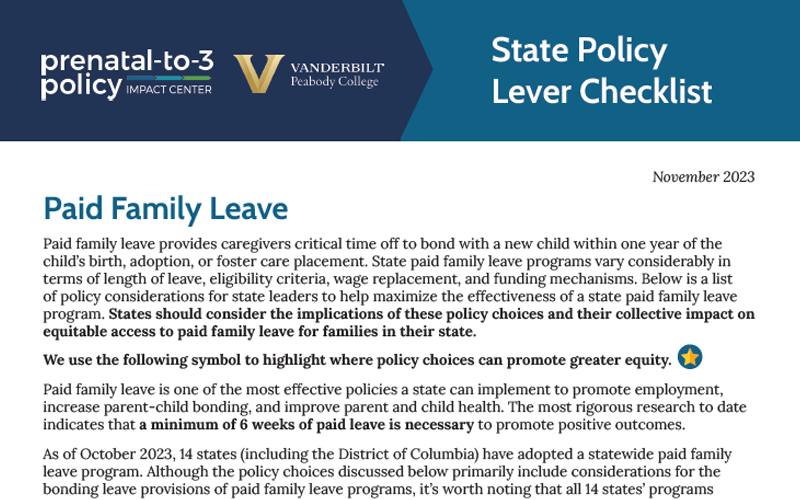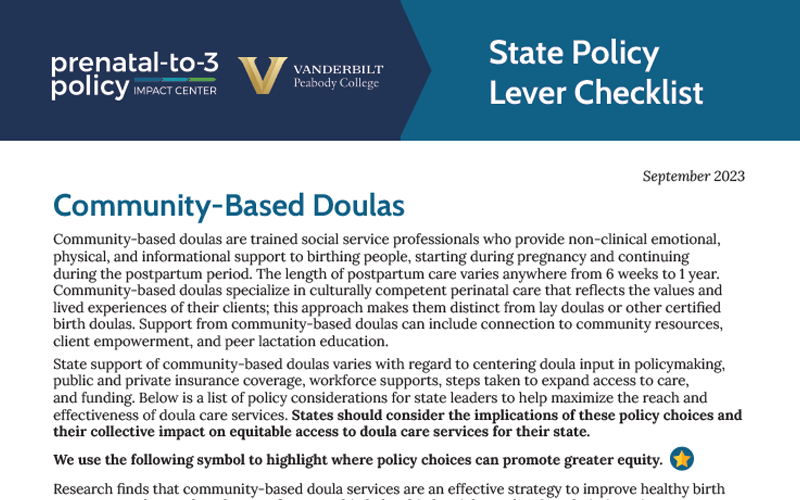Though most legislative sessions have adjourned, lawmakers and advocates across the country continue to advance efforts to support children and families. A lot can happen at the tail end of a legislative session, as Colorado and Iowa have shown by sending their governors a flurry of bills aimed at strengthening the prenatal-to-3 system of care. Meanwhile, at least one state is just getting started; the last to kick off their regular session, North Carolina gaveled in on April 24 and quickly introduced several bills to enhance child care, establish tax credits for families, and create a statewide paid family leave program.
In this final installment of our 2024 prenatal-to-3 legislative updates, we dive into the details on these and other bills that have passed or are nearing the finish line. Stay tuned for a comprehensive summary of introduced and enacted legislation in our 2024 Prenatal-to-3 State Policy Roadmap, which will be released this fall.
Early Care and Learning
Early care and education remain top-of-mind for state policymakers, as many sent bills on child care subsidies, early childhood governance, and the child care workforce to their governors’ desks over the past month.
- Colorado: H.B. 1223 would make several changes to promote family and provider participation in the child care subsidy program and currently awaits the governor’s signature. The bill would require the state to simplify the subsidy application, cap copayments at 7% of family income, make child care workers categorically eligible for subsidies, and reimburse providers based on enrollment rather than attendance, among other changes.
- Iowa: Governor Kim Reynolds signed H.F. 2658, which requires the state to reimburse child care providers based on a recent market rate survey, make child care providers categorically eligible for subsidies for another year, and publish data on how children are being served through the subsidy program.
- North Carolina: At the start of the state’s session, legislators introduced H. 1055 and S. 878, which would cap copayments at 7% of family income. Legislators also introduced S. 822 to fund grants designed to improve care quality, increase wages, and make child care workers eligible for free child care.
- Illinois: S.B. 1, which awaits signature by the governor, would consolidate the governance of several early childhood programs, including home visiting, early intervention, preschool, and child care, under a new Department of Early Childhood.

This post outlines some of the new federal child care rule's implications, such as requiring states to cap subsidy copayments at or below 7%. Read our full analysis of the rule.
Economic Supports for Families
Since our last update, a few states have advanced bills to create or modify paid family leave programs and to improve household economic security by establishing or enhancing state earned income tax credits (EITCs) and child tax credits (CTCs).
- New York: The state enacted its 2025 budget, which adds 20 hours of paid leave for prenatal care to the state’s existing 12-week paid family leave program.
- Maryland: Legislators enacted companion bills S.B. 485/H.B. 571 to modify the state’s Family and Medical Leave Insurance Program, including a 9-month delay to premium collection (new start date: July 1, 2025) and a 6-month delay to benefit payments (new start date: July 1, 2026).
- North Carolina: Lawmakers introduced bills related to both paid family and medical leave and tax credits in May. S. 815 would create a 12-week paid family and medical leave program, and S. 816 would re-establish a refundable state EITC worth 5 percent of the federal credit, which was previously eliminated in 2014. S. 878 would, in part, create a refundable state CTC worth $125-$250 per child, depending on income and filing status.
- Colorado: Governor Jared Polis signed two family tax credit bills sent to his desk in the final days of the state’s legislative session. H.B. 1134 will increase the generosity of the state EITC—to 50 percent of the federal credit for tax year 2024, 35 percent for 2025, and 25 percent for 2026 and beyond. The bill also builds in increases in generosity based on yearly fiscal forecasts. On top of the state’s EITC and CTC, H.B. 1311 will create a family affordability tax credit. Effective tax year 2024, eligible families will receive $3,200 for each child ages 0–5 and $2,400 for each child ages 6–16.
- Ohio: Lawmakers introduced S.B. 256, which would add an option for a refundable state EITC that is more generous for families with young children in addition to the existing nonrefundable state EITC. The bill would allow families to either claim the nonrefundable credit, or to claim a refundable EITC worth 12 percent of the federal credit for families with children under age 3, and 9 percent of the federal credit for other eligible families.

Our State Policy Lever Checklist contains a list of policy considerations for state leaders to maximize the effectiveness of a state paid family leave program.
Child and Parent Health
Lawmakers in Kansas and Mississippi seriously considered expanding Medicaid this session. Ultimately, however, those bills did not pass. But many other states did advance legislation to improve the health and wellbeing of children and families by improving access to community-based doulas and extending Medicaid coverage in the postpartum period.
- Iowa: Governor Kim Reynolds signed S.F. 2251 into law, extending Medicaid coverage through 12 months postpartum for women and infants with incomes at or below 215% of the federal poverty level. In most states, pregnant people can access Medicaid at higher income levels than other adults, but pregnancy coverage has historically lasted for only 60 days following birth. Iowa’s enactment brings the total number of states that have extended postpartum Medicaid to 48, plus the District of Columbia.
- Colorado: S.B. 175, which awaits the governor’s signature, would require private insurance plans to cover doula services in the same scope and duration as the state’s Medicaid program. Additionally, the bill would require that hospitals report data on birth outcomes to the designated state perinatal care quality collaborative by July 2025 and, beginning in December 2025, participate in at least one maternal or infant health quality improvement initiative each year.
- Illinois: H.B. 5142/S.B. 3665 would require private insurance to cover doula services along with additional coverage related to midwives. Specifically, coverage would include all pregnancy, postpartum, and newborn services that perinatal doulas or certified professional midwives provide. Covered services include home births, home visits, and support during labor, abortion, or miscarriage.
- Pennsylvania: H.B. 1608, which would provide Medicaid coverage for doulas and require the state to create a doula advisory board, passed the House last month. Though Pennsylvania has not yet submitted a state plan amendment for doula Medicaid coverage, the state has allowed doulas to enroll as Medicaid providers and work as in-network providers since early 2024.
- Tennessee: Governor Bill Lee signed SB1832, which recognizes the importance of community-based organizations in providing doula support and creates the Tennessee Maternal Health Equity Advisory Committee. The bill charges the committee to review maternal health data, identify disparities in care delivery, and make recommendations to enhance health outcomes.

Our State Policy Lever Checklist for community-based doulas helps lawmakers consider workforce supports, insurance coverage, and other factors in access to care.
This post closes out our series of legislative updates for the year—we hope these month-by-month snapshots of legislative activity in the prenatal-to-3 space have helped you in your work! Watch out for an upcoming brief summarizing legislation impacting young children and their families this session, as well as a deeper state-by-state analysis in our 2024 Prenatal-to-3 State Policy Roadmap. Sign up for our emails and follow us on social media to stay in the know!



